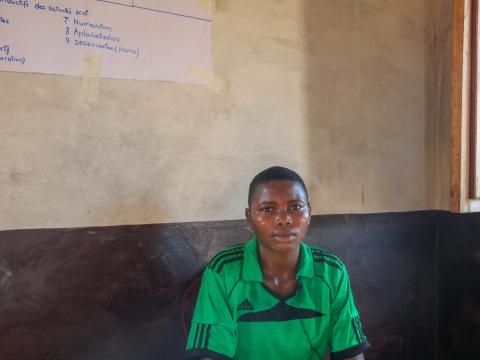Marie is playing for the future in Kazumba, Kasai Central, DRC

When I first meet Marie she’s playing football with other teenage girls at a World Vision Child Friendly Space, an hour and a half drive from the regional capital of Kananga in Kasai Central in the Democratic Republic of Congo.
Bright and full of life, Marie is also one of the 2.3 million children who have been affected by the crisis that broke out across the Kasai provinces in late 2016. Now, almost two years since the beginning of the violence, peace has mostly returned to the Kasais, but the effects of the violence still linger.
As families returned home from the bush last autumn and school reopened, Marie was lucky enough to have parents who could still afford to send her to school. However, appendicitis yanked her back out of classes this spring, and so for the second year in a row, she’s now not managed to finish Year 4. Out of school, she sometimes finds it difficult to feel positive about the future.
“The militia came to my house.” Marie tells me. “They came and tried to make me join the insurrection. And when we refused, they forced their way into the house. There were children younger than me and adults in the group that came and tried to make me join.”
During the crisis, my cousin died. My Aunt's son... He got killed, just like that. It was the militia who killed him, when they came to our house.
When the crisis began, I was with my big brother and my Aunt. We spent a month hiding in the forest after we fled. When we were hiding in the forest, we had to drink the dirty water. The forest wasn't a nice experience, we were getting sick while we were there. We were surviving off of cassava leaves. We picked them off the ground and had to eat them without cooking. For me, the forest wasn't very nice. I was getting bitten by all the insects.
I knew some of the people who came for us. I still see some of them, and others died. One of the children and one of the adults from the militia just sit at home; they aren't working or anything.
I feel like things are getting better when I'm at school, but now that I'm not at school I'm worried.
I've heard that the militias might be restarting. During the war, a lot of people were killed. It's one of the things I don't like about the militias - they killed a lot of people. We saw the films that they took, how they were decapitating people. We're scared.
It was horrible how we all killed each other.”
Marie glances out the window, where some of the children have started playing music and dancing. “If I could be anything,” she says, “I’d be a lawyer. I want to become a judge.”
Until the new school year starts though, there isn’t much Marie can do to pursue the education she needs to achieve her dream of making life fairer for her community. But at the CFS she can play football with the other children and receive support to process the death of her cousin and the month she spent hiding in the woods. As we thank her for sitting and speaking with us, Marie grins and joins the other children to lead the dance party.
World Vision has been responding to the crisis in the Kasais since August 2017 and has reached over 497,000 people to date, including 38,164 children through education programmes and Child Friendly Spaces in Kasai and Kasai Central. Marie was one of 100 children recently interviewed by World Vision for the report, Will You Hear Us? 100 children in DRC tell their story.